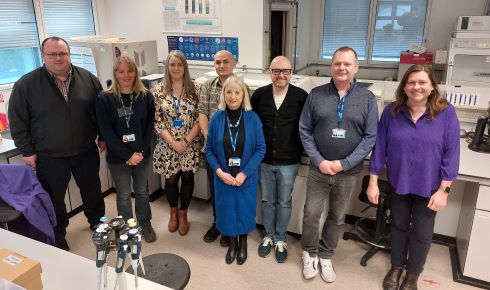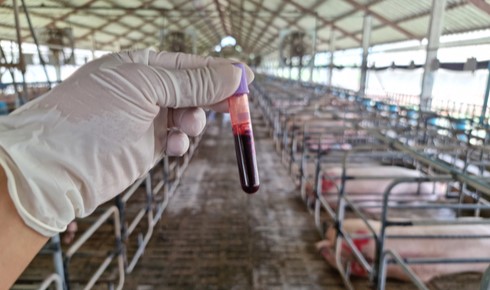My Lab Unlocked: Sara Louise Cosby, Professor of Virology at AFBI

Professor Sara Louise Cosby (above, centre) on the importance of effective viral diagnosis in the agricultural world
The work of the Virology Branch in the Agri-Food and Biosciences Institute (AFBI) is aimed at improving diagnosis and control of viral diseases of farmed animals. This includes pigs, poultry, cattle, sheep and fish, in support of the Department of Agriculture Environment and Rural Affairs (DAERA) policy objectives on animal health and welfare of Northern Ireland livestock.
The diagnostic laboratories are responsible for delivering statutory and commercial molecular and serological testing, particularly in relation to epizootic and emerging viral diseases such as avian influenza, Newcastle disease virus, bluetongue virus and African and classical swine fevers. Screening for transmissible spongiform encephalopathies and fish diseases is also carried out routinely.
The virology department has a major international reputation for research and innovation, and works with a range of commercial, government, university and research organisations. Research in mammalian and avian viral diseases focuses on novel vaccine design, including recombinant and live attenuated vaccines, with associated animal trials. Virome/microbiome analysis by next generation sequencing is also a focus, with associated work on alternatives to antibiotics. Surveillance for new and emerging viruses is a rapidly up-and-coming area related to pandemic preparedness.
The major challenges for our work are related to both endemic and new and emerging virus diseases of animals. For example, endemic infections by respiratory viruses – such as bovine respiratory syncytial virus, bovine herpesviruses, bovine paramyxovirus and bovine coronavirus – which can initiate the multi pathogen bovine respiratory disease complex (commonly known as pneumonia) – is a focus, to develop more effective vaccines.
Porcine respiratory disease complex (PRDC) and porcine circovirus-associated disease (PCVAD) generate substantial economic losses, despite pigs been vaccinated against the primary causative virus. Understanding virome interactions – and specifically co-infections – is crucial.
 Surveillance for new and emerging viruses in animals is essential not just for pandemic preparedness, but also to avoid substantial economic losses
Surveillance for new and emerging viruses in animals is essential not just for pandemic preparedness, but also to avoid substantial economic losses
Similarly, diseases important for the poultry Industry such as runting stunting syndrome and white chick hatchery disease require better understanding and effective vaccine development. Bluetongue virus (BTV), which affects sheep, cattle, deer and camelids and Epizootic haemorrhagic disease virus (EHDV), which affects mainly deer but also sheep and cattle, are both spread by the biting midge, Culicoides, and have moved across Europe due to climate change allowing the insects to move north.
We now have BTV established in SE England. An emerging disease concern for both animal and human health is highly pathogenic avian influenza (HPAI) such as H5N1 and H5N8. H5N1 has recently been detected in mammals and novel adaptive mutations identified in foxes in Northern Ireland by Virology staff.
Monitoring for all these disease threats is rapidly increasing and new types of vaccines and antivirals are required for prevention and treatment. In light of the Covid pandemic and the animal origin of the viruses responsible, systems are also being put in place to monitor for an unknown pathogen ‘X’ arising in animal populations. This pandemic preparedness approach is an extensive amount of work but crucial to protect both animal and human populations going forward.
As Virology at AFBI covers a wide range of diseases and has both diagnostic and research laboratories, it is an interesting and diverse environment to work in with opportunities for staff to move between different areas. We also have a wide range of state- of- the- art equipment for molecular and immunological work, as well as tissue culture and infection facilities for classical virology techniques and a bioreactor for production of bacteriophage. Facilities include biological containment level 2 (BCL2) and level 3 (BCL3) laboratories, BCL3 large animal facilities and experimental fish tanks.
We are interested in collaborating with universities, research institutes and industry both nationally and internationally on all aspects of our research. We are particularly looking for collaborators for international grant calls and seek links with RSB international members/Fellows in appropriate geographical areas and disciplines. We have experts in-house on a range of viruses as well as molecular techniques and large animal models. We also have commercial contracts and can carry work as a Contract Research Organisation.
Our current research funding sources include DAERA, research councils, innovate UK, Invest Northern Ireland, the EU and commercial companies.
Find out more about AFBI.
Head of Virology Branch with the Heads of Virology Laboratories, from Left to right:
Dr PJ Collins, Head of Animal Experimental Studies Unit
Jane Morrow, Head of Immunodiagnostics Laboratory
Sharon Cassidy-Collins, Head of Transmissible Spongiform Encephalopathies and Brucella Diagnostic Laboratories
Dr Ken Lemon-Head of Mammalian Virology Unit
Professor Louise Cosby, Head of Virology Branch
Dr Michael McMenamy, Head of Virus Molecular Diagnostics Laboratory
Paul Savage, Head of Fish Diagnostics Unit
DR Victoria Smyth, Head of Avian Virology Unit.
Professor Sara Louise Cosby FRSB is head of the Virology Branch at the Agri-Food and Biosciences Institute


